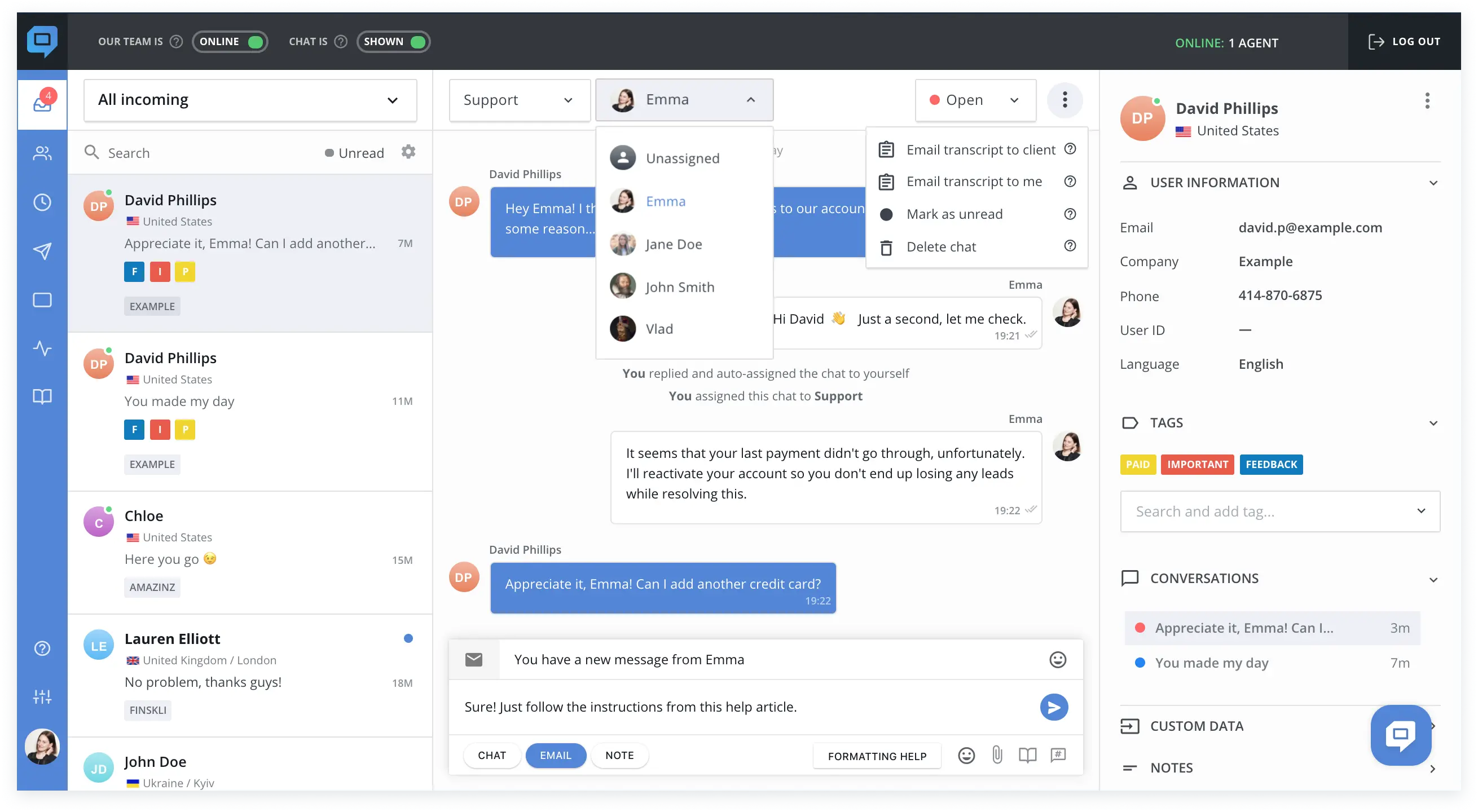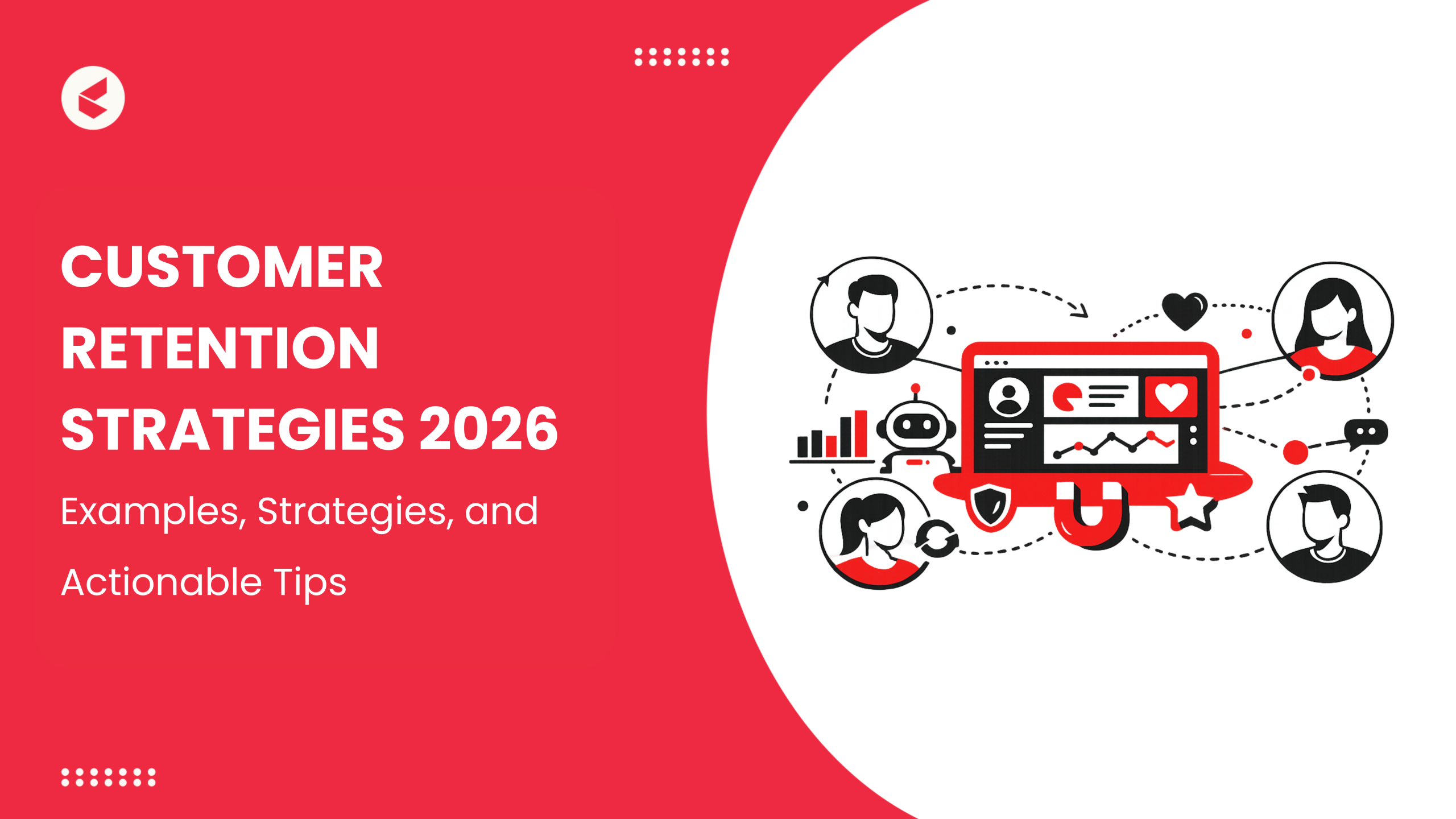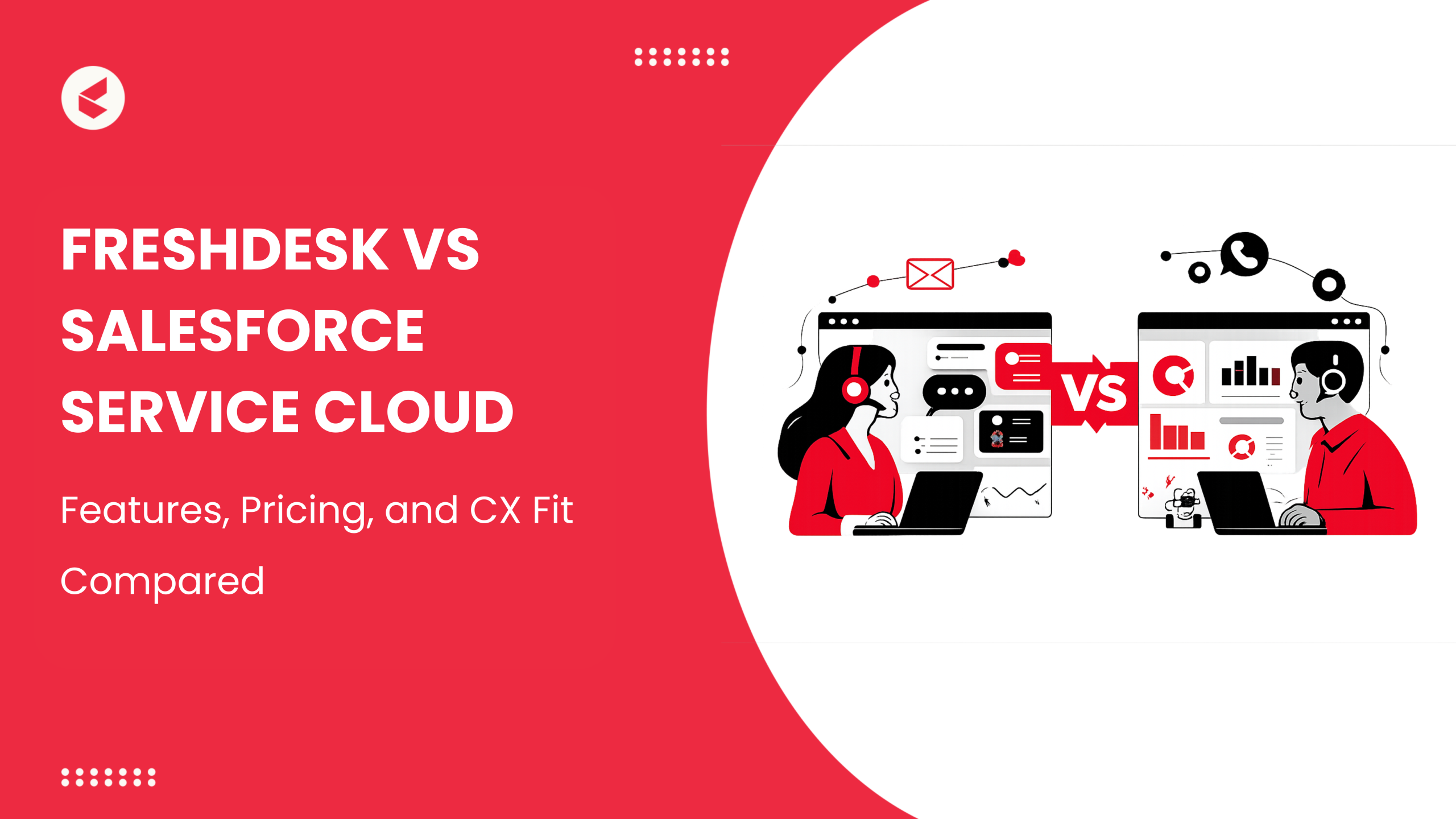Customer support has evolved dramatically in the AI era. It’s no longer just about fixing complaints; it’s about predicting issues before they surface and resolving them instantly.
In 2026, a basic ticket management system won’t cut it anymore. It would neither work for your customer support teams nor the end users. You need aspects like predictive analytics, AI-powered workflows, and dynamic data to provide a reliable customer experience.
Users these days demand speed and clarity when they come to you with their issues. The right software helps you deliver that without burning out your team.
In this blog, we’ll break down what the best ticket management tools entail in 2026, their features, and the top 15 ticket management software you must know about.
What Is Ticket Management Software?
Ticket management software is a central hub where customer queries are tracked, organized, solved, and archived. It gives you a centralized view of all incoming issues and assigns them to the right team or agent. That’s the core function.
But in 2026, that’s just the starting point. The smarter platforms today don’t wait for agents to triage; they auto-prioritize, suggest next steps, and feed insights straight into your product or ops teams. In modern CX, ticket management software is more than a tracking tool—it’s the backbone of proactive customer support.
Must-Have Features in a Modern Ticketing System
In 2026, users demand a smooth experience across channels without much hassle. For that, your ticketing system needs to be smarter, faster, and built to handle complexity.
When evaluating the best ticket management software, these are the features to look for in 2026.
| Feature | What It Does | Why It Matters |
| Omnichannel Ticketing | Collects requests from email, chat, social, and more in one place | No more juggling tabs or missing messages |
| Auto-Routing & Prioritization | Sends the tickets to a relevant agent with relevant skills | Cuts down the resolution time |
| SLA Tracking & Escalations | Tracks response times and automatically flags overdue tickets | Keeps your team accountable and customers informed |
| Agent Assist & AI Bots | Suggests replies, surfaces knowledge articles, and handles simple queries | Cuts down response time and reduces manual workload |
| Knowledge Base & Canned Responses | Offers quick access to answers through self-service content | Saves agents time, helps customers help themselves |
| Internal Notes & Team Collaboration | Lets your teams tag each other, share context, and troubleshoot together | Avoids back-and-forth and improves handovers |
| Reporting & Analytics | Tracks volume, trends, response time, CSAT, and more | Gives you the data to improve |
Ticket Management Software at a Glance
Choosing the right tool depends on your scale, team structure, and how much AI you’re ready to adopt.
Here’s a quick comparison of the top 15 ticket management software options to help you decide at a glance:
| Tool | Ideal For | Unique Selling Points | AI Capabilities |
| Kapture CX | Enterprise CX, AI-first ops | Verticalized automation, full coverage QA, agentic AI | Advanced agent assist, auto triage, sentiment analytics |
| Zoho Desk | SMBs, regional support teams | Localized workflows, mobile-first design | Zia AI for replies, triaging, anomaly detection |
| Zendesk | Mid-to-large support teams | Clean UI, structured enterprise deployment | Intent detection, conversation summarization |
| Help Scout | Remote, human-first teams | Simple interface, no extra AI fees | AI drafts, thread summaries, and multilingual support |
| Freshdesk | High-volume support centers | Freddy AI copilot, up to 5K collaborators | Smart replies, no-code workflows |
| LiveAgent | Lean support teams with voice needs | Built-in call center, fast setup | AI chatbot, IVR-based call routing |
| Kustomer | Data-driven brands, complex journeys | Unified timeline, CRM-like flexibility | Predictive workflows, AI for voice |
| Genesys Cloud CX | Enterprise contact centers | Workforce AI, omnichannel orchestration | Journey analytics, agent engagement AI |
| LivePerson | CX transformation and scale | Conversational commerce + AI orchestration | Bot-human coordination, voice + messaging AI |
| Gorgias | DTC ecommerce brands | Shopify-native support + sales AI | Shopping assistant, AI replies |
| HelpCrunch | Startups, SMBs with support+marketing | Shared inbox + email marketing in one | AI editor, smart auto messages |
| HappyFox | Mid-sized IT, HR, internal ops teams | Smart rule engine, highly customizable | Rule-based automation, auto escalation |
| ProProfs | Lean internal teams, education | Simple UX, ecosystem of lightweight tools | Basic AI for replies and KB deflection |
| Intercom | Automation-ready, scale-ups | Unified suite + Fin AI agent | Autonomous issue resolution, workflows |
| ServiceNow | Enterprises, digital operations | Cross-functional orchestration, low-code apps | Swarming AI agents, anomaly detection |
Top 15 Ticket Management Software Tools to Try in 2026
From auto-routing to AI agents that can preempt a complaint before it hits your inbox, the right ticket management software can change how your entire support operation runs.
Let’s get into the 15 best tools:
1. Kapture CX
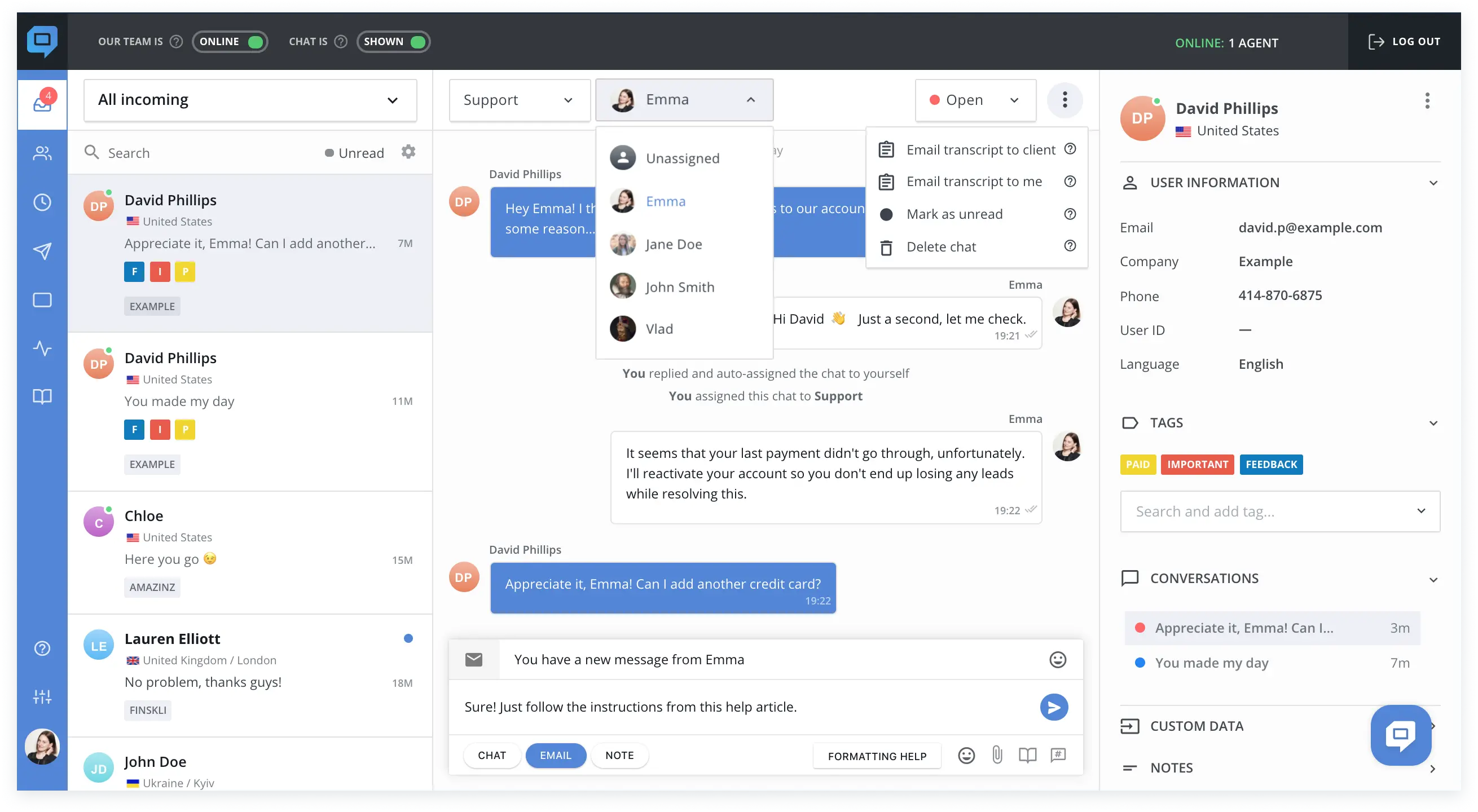
Kapture CX is a modern, AI-driven ticket management software built to support speed and scale. It focuses on automating ticket deflection, smart routing, and offering pre-built workflows tailored to different industries. This helps teams reduce manual effort and handle high ticket volumes more effectively.
Best Features
- Intelligent self-service across multiple channels that can resolve a majority of common queries.
- AI-guided responses, conversation summaries, and multi-channel support for agents.
- Real-time insights into trends and ticket patterns through Kapture Insights.
Ideal for: Enterprises and digitally mature businesses that want to leverage AI for large-scale customer support.
Cloud-Based: Yes
| 🔑 What makes it stand out? Kapture emphasizes industry-specific workflows and automation, which helps businesses scale customer support with less setup complexity. |
Ratings & Reviews
2. Zoho Desk
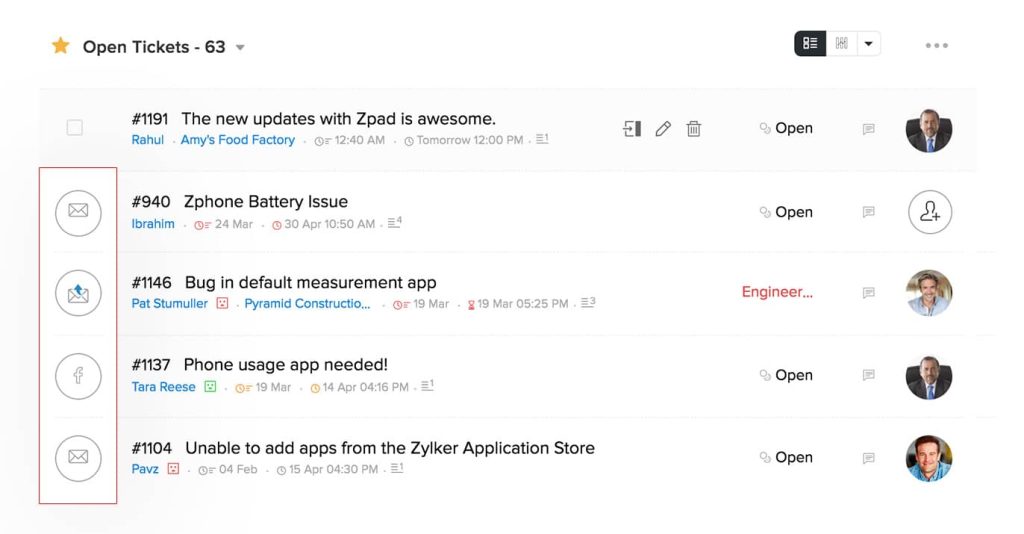
Zoho Desk blends simplicity with scale, making it a go-to for businesses that want structure without complexity. It’s designed to meet India-first customer service needs; local language support, mobile-first capability, and workflows that flex with fast-growing teams. Its AI assistant, Zia, handles repetitive work with precision: routing tickets, detecting anomalies, and offering reply suggestions in real time.
Best Features
- Automate replies, detect issues, and help agents close faster with the Zia bot.
- Create structured flows for more efficient support interactions between your agents and customers
- Consolidate requests from chat, email, social, and phone
Ideal For: Growing businesses and regional support teams that need smart automation
Cloud-Based: Yes
| 🔑 What makes it stand out? Zoho Desk adds AI that matches your team’s pace. It is smart, helpful, and free of the enterprise bloat so that your teams can function smoothly. |
Ratings & Reviews
3. Zendesk
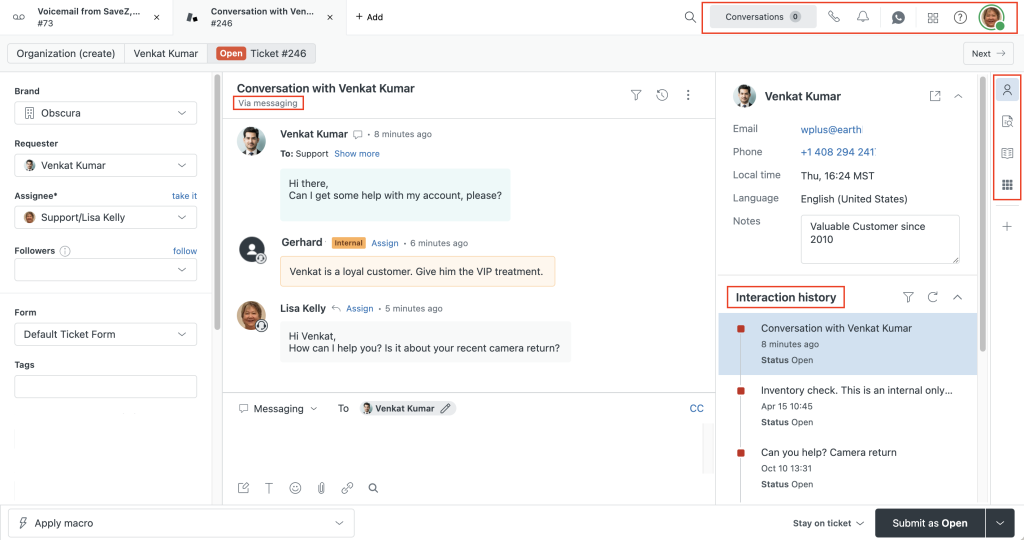
Zendesk is built for teams that need structure at scale. What sets it apart isn’t just that it works across channels; it’s how well it connects data, people, and context in one place. From auto-summarizing tickets to detecting intent and urgency, Zendesk’s AI isn’t just fast; it’s precise. Agents get full conversation history, actionable suggestions, and a clean UI that reduces clutter and clicks.
Best Features
- Manage all support channels in one location, so your agents don’t lose context or waste time between tabs.
- Accelerate resolutions with AI that identifies intent, offers responses, and prioritizes tickets before your staff clicks.
- With built-in real-time dashboards, performance analytics, and workflow automation, your support data will remain sharp and helpful.
Ideal for: Mid-to-large teams that handle complex, high-volume support
Cloud-Based:Yes
| 🔑 What makes it stand out? Zendesk perfectly integrates structure and speed, allowing support agents to manage high-volume assistance with ease. |
Ratings & Reviews
4. Help Scout
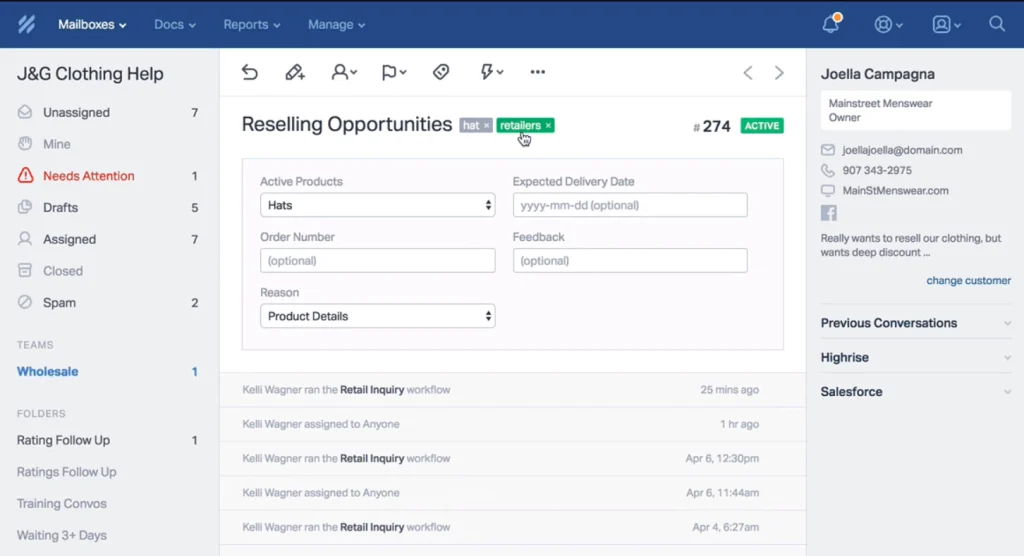
Help Scout brings all your customer emails, chats, and help docs into one clean inbox where your team can collaborate without stepping on each other’s toes.
It’s built-in AI writes drafts, translates messages, and summarizes long threads so agents don’t waste time. It’s incredibly easy to use, requires little to no training, and doesn’t nickel-and-dime you for advanced features.
Best Features
- Draft, edit, and translate responses instantaneously, with no additional fees.
- Automate labeling, routing, and reminders to reduce manual labor.
- Get a simple interface that allows teams to communicate without overlap or confusion.
Ideal for:Customer-centric teams that prioritize human-first service and want a collaborative support tool with smart AI assistance.
Cloud-Based: Yes
| 🔑 What makes it stand out? Helpscout is one of the only platforms where AI compliments, rather than replaces, a human-first approach, making it suitable for support teams that lead with empathy. |
Ratings & Reviews
5. Freshdesk
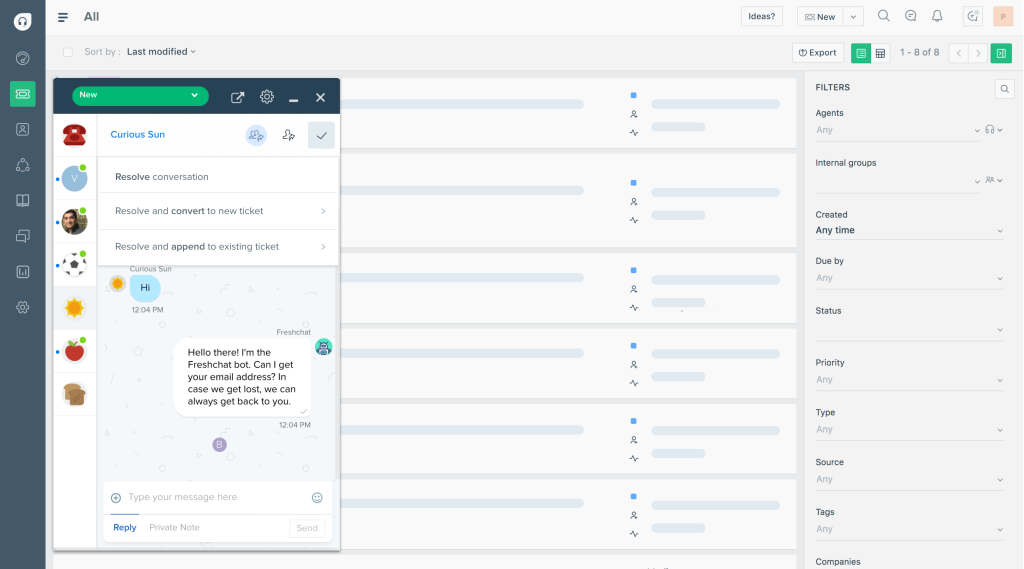
Freshdesk offers an excellent balance between strong automation and a user-friendly interface. Its AI technology, Freddy AI, assists with repetitive queries, intelligent ticket routing, and cross-channel assistance.
You can bring in internal collaborators without extra licenses, customize workflows with no-code tools, and even track performance with detailed reports.
Best Features
- Handle the busywork with AI-generated replies and smart recommendations.
- Loop in up to 5,000 internal users without extra licenses.
- Personalize the platform to match your team’s structure and logic.
Ideal For: It’s ideal for high-volume support teams that want to move fast without getting stuck in complicated setups.
Cloud-Based: Yes
| 🔑 What makes it stand out? Freshdesk quietly powers large teams with collaborative tools that don’t require extra licenses or workarounds to include non-support roles. |
Ratings & Reviews
6. LiveAgent
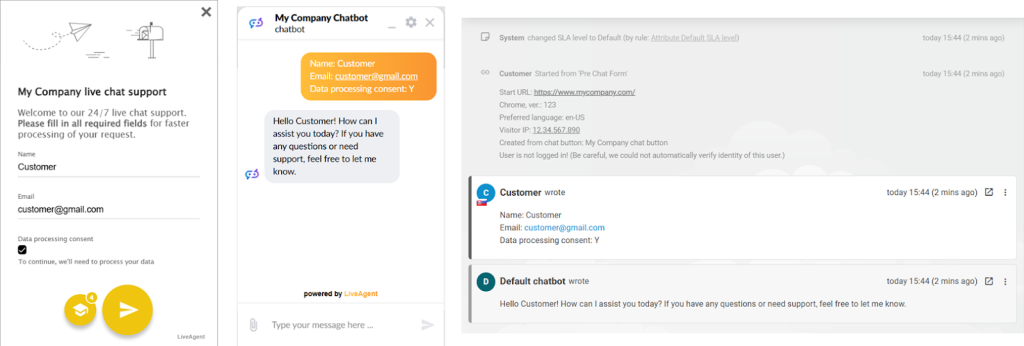
LiveAgent integrates live chat, email, call center, and social messaging into a single dashboard, ensuring that your team never misses a beat.
Their AI handles mundane inquiries, while agents focus on significant conversations. This means you spend less time training and more time solving.
Best Features
- IVR, recordings, and agent availability tools come with built-in voice capabilities.
- Engage clients with various platforms like as WhatsApp, Instagram, Facebook, and Twitter.
- Create and publish help articles easily from the dashboard.
Ideal For: LiveAgent is for support teams that want speed, flexibility, and a strong human touch.
Cloud-Based: Yes
| 🔑 What makes it stand out? LiveAgent’s edge lies in giving small teams enterprise-level voice capabilities without the usual infrastructure costs or setup time. |
Ratings & Reviews
7. Kustomer
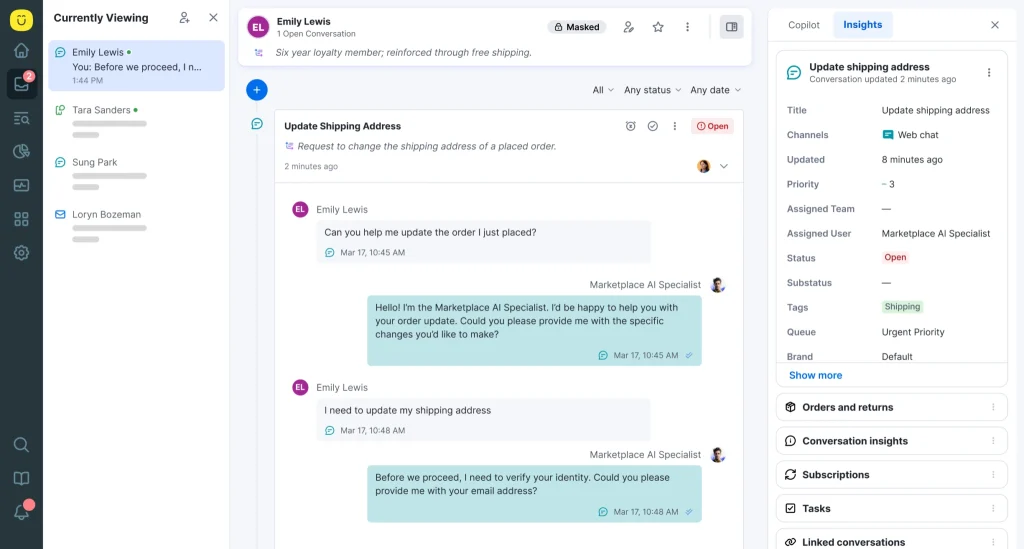
Kustomer is a support platform built like a CRM, so service teams work from rich customer records instead of scattered tickets. It enables agents to oversee the entire ticketing system from a single interface without switching channels.
The tool’s workspace is clean, and it specifically tailors to those with high-volume ticketing needs. With kustomer, managers get clear visibility into workload and quality, while admins can shape data fields and rules to match the business.
Best Features
- Get fully integrated AI along with live voice support.
- Use historical data to anticipate customer needs and route accordingly.
- Create a flexible structure to manage unique customer data and operations.
Ideal For: Data-driven teams, high-touch industries, brands with complex support flows
Cloud-Based: Yes
| 🔑 What makes it stand out? Kustomer approaches each interaction as part of an ongoing relationship rather than a one-time occurrence, which is unusual in this field. |
Ratings & Reviews
8. Genesys Cloud CX
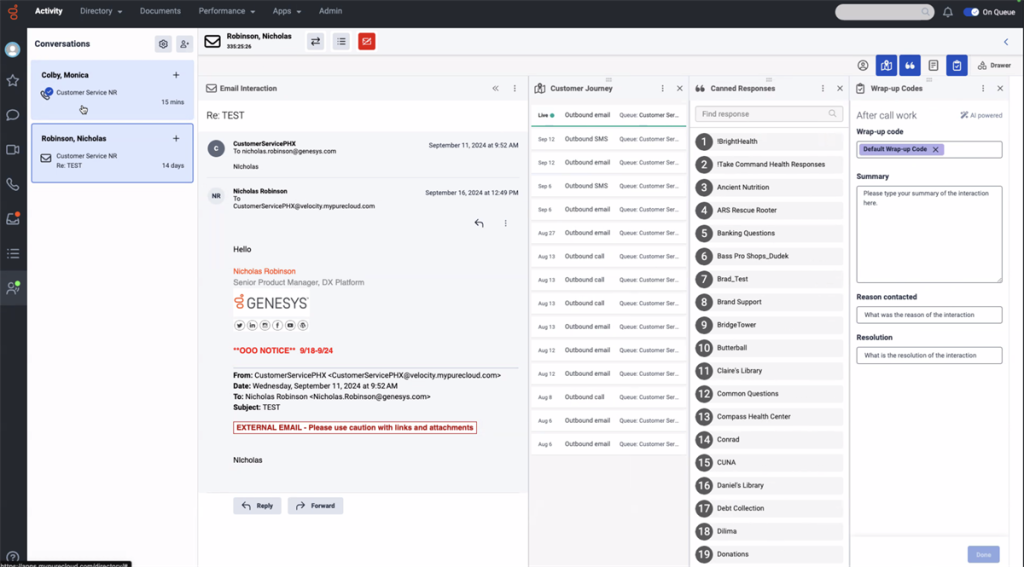
Genesys Cloud CX is a comprehensive CX engine that integrates voice, chat, messaging, and social into a single continuous customer journey. Genesys provides real-time data, workforce management capabilities, and AI-powered predictions all inside one platform.
Best Features
- Connect data across all touchpoints for real-time customer insights.
- Use AI-powered scheduling, forecasting, and agent performance tools.
- Scale globally while supporting regional telephony regulations.
Ideal For: Enterprise contact centers, heavily regulated industries, global teams.
Cloud-Based: Yes
| 🔑 What makes it stand out? It’s built to unify global CX teams under one AI-led command center, where workforce management and service orchestration happen in sync. |
Ratings & Reviews
9. LivePerson
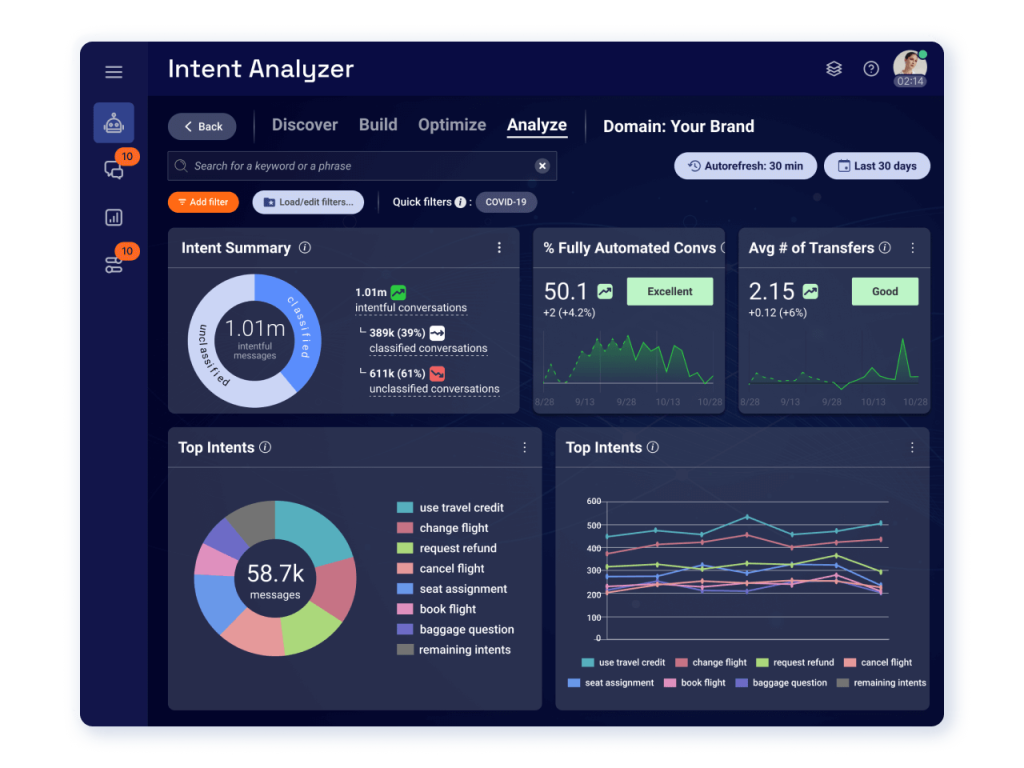
LivePerson is designed specifically for organizations wishing to scale discussions. Its Conversational AI technology combines digital, audio, and messaging into a single and unified flow, allowing you to automate with precision while keeping people involved when it counts the most. What distinguishes LivePerson is its deep integration of AI orchestration with real-world outcomes.
Best Features
- Manage AI, bots, and human agents in real-time across channels.
- Monetize customer interactions with personalized, on-demand sales experiences.
- Turn conversational data into high-value insights across voice and digital.
Ideal For: Large enterprises, CX transformation teams, AI-focused digital support
Cloud-Based: Yes
| 🔑 What makes it stand out? LivePerson goes beyond help by transforming conversations into measurable outcomes that are directly related to sales, retention, and efficiency. |
Ratings & Reviews
10. Gorgias
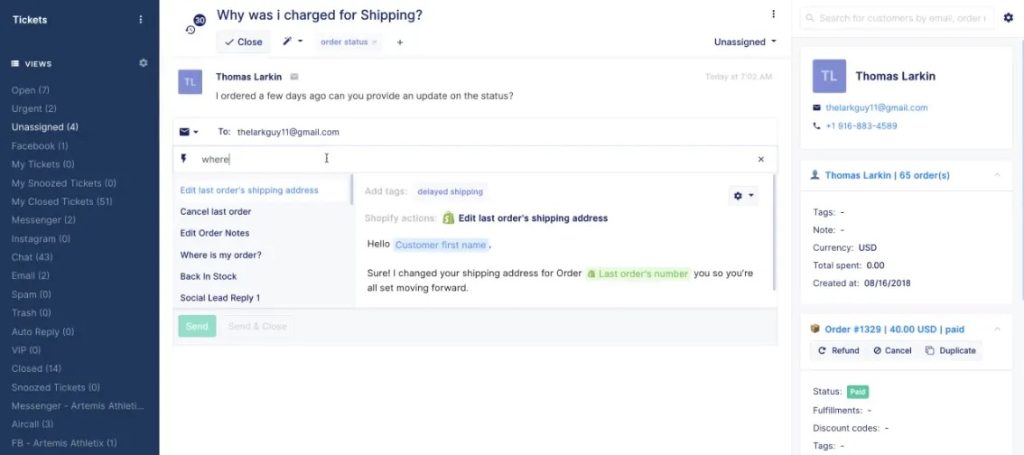
Gorgias is an AI-powered customer support platform built keeping ecommerce brands in mind. It helps drive sales by turning customer conversations into revenue.
With comprehensive Shopify integration, your team can amend orders, manage inventory, and run promotions all from within the platform. Gorgias also integrates support and marketing across chat, email, SMS, and social channels, automating up to 60% of requests.
Best Features
- Handle support and sales with personalized, brand-aligned automation.
- Edit orders, check inventory, and launch promos directly inside the platform.
- Launch real-time chat prompts to reduce bounce and boost conversions.
Ideal For: DTC ecommerce brands, fast-scaling online stores, CX-driven revenue teams
Cloud-Based: Yes
| 🔑 What makes it stand out? It bridges the gap between customer care and ecommerce income by allowing agents to act on store data during the discussion. |
Ratings & Reviews
11. HelpCrunch
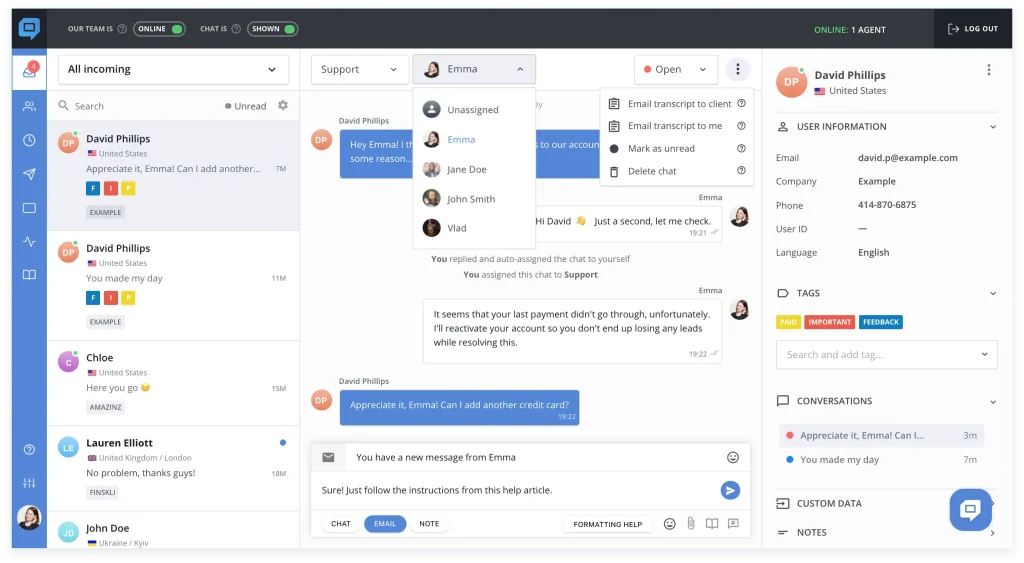
HelpCrunch is a multichannel support and marketing platform that blends live chat, email automation, and AI tools into one customizable workspace. Designed to reduce support complexity, it unifies customer conversations across email, chat, messengers, and popups; all under one dashboard with a shared inbox and a clean UI.
Best Features
- Generate complete replies or help docs from a few words.
- Plan your email campaigns and other lead engagement activities through built-in marketing tools.
- Create an easy-to-access knowledge hub so your agents can focus on solving more important problems.
Ideal For:SMBs, support+marketing teams, fast-moving startups
Cloud-Based: Yes
| 🔑 What makes it stand out? HelpCrunch brings support and marketing under one roof, letting you turn chats into conversions without switching platforms. |
Ratings & Reviews
12. HappyFox
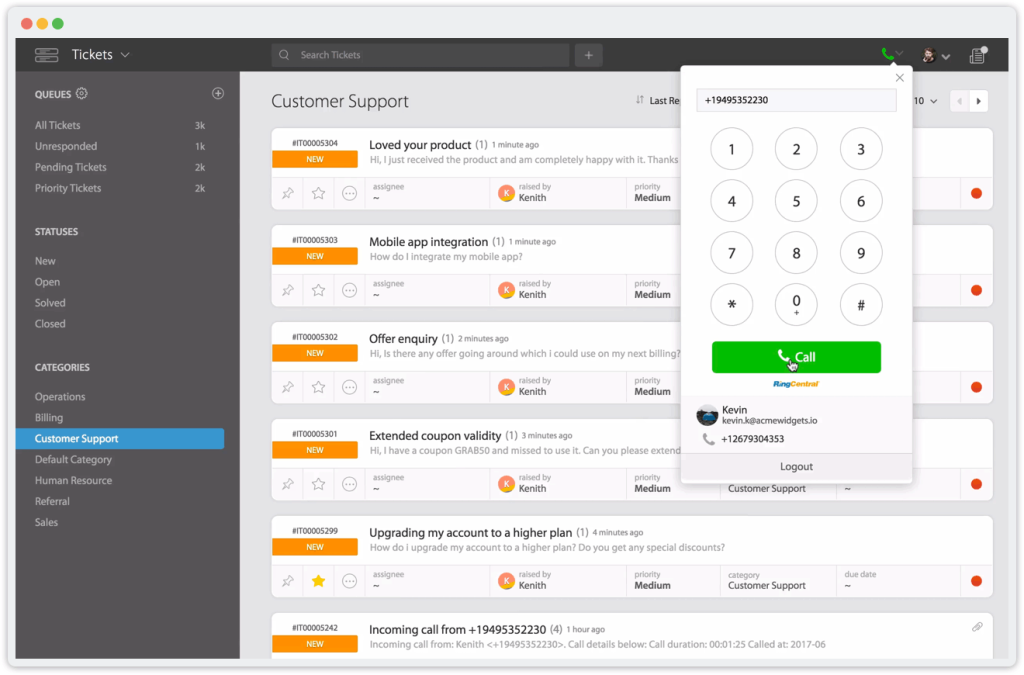
Happyfox pulls email, chat, phone, and web requests into one clean queue, so your team isn’t juggling tabs. Its automation features help you route tickets to the most relevant agent, and the SLAs help keep track of the priorities.
The reporting features are clear and easy to share. You can tailor fields and workflows easily without much hassle. For support, IT, or HR, it scales from small teams to enterprise.
Best Features
- Tailor ticket flows to match your internal processes and priorities.
- Get visibility into the bottlenecks of your workflows and track your tickets automatically based on priorities.
- Set response/resolve targets with timers and alerts so tickets meet deadlines.
Ideal For: Mid-sized to large teams across support, IT, HR, and internal ops
Cloud-Based:Yes
| 🔑 What makes it stand out? Happyfox is built for operational clarity, letting internal and external support teams work with the same precision, minus the bloat. |
Ratings & Reviews
13. ProProfs Help Desk
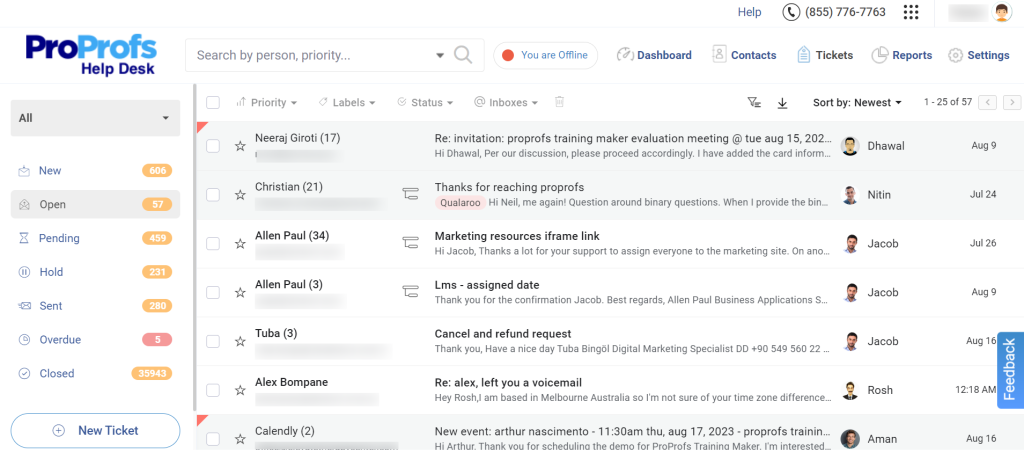
ProProfs Help Desk is a lightweight ticketing system that focuses on usability, speed, and clarity. What sets ProProfs apart is its network of simple, focused solutions that integrate seamlessly to help reduce issues, improve onboarding, and gather data.
It’s ideal for small support teams that want to stay lean, move fast, and deliver consistent service without complex workflows.
Best Features
- Deflect tickets with 24/7 self-service and save your agents a lot of time.
- Streamline responses across email, chat, and more. Be present wherever your customers are.
- Collect CSAT, NPS, and targeted feedback easily.
Ideal For: SMBs, educational teams, internal support functions
Cloud-Based: Yes
| 🔑 What makes it stand out? ProProfs Helpdesk’s strength lies in its simplicity—it works right out of the box for lean teams that don’t want a complex onboarding curve. |
Ratings & Reviews
14. Intercom
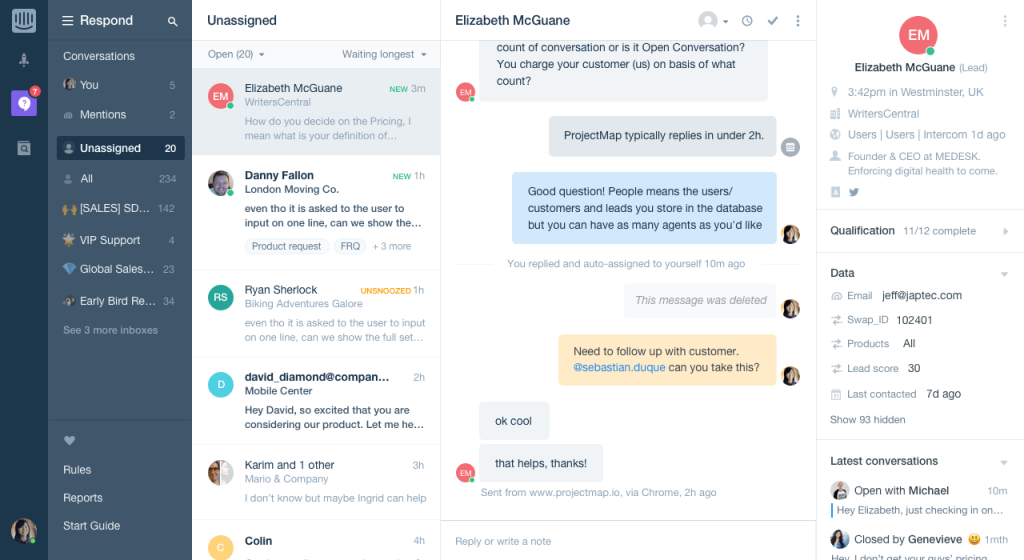
Intercom presents itself as a true AI-first support platform, designed to reduce human intervention and resolution time using its strong Fin AI Agent.
Intercom offers a simplified package that combines AI, agent tools, and customer data in a single workspace, allowing for faster responses and fewer transfers.
It’s especially useful for teams that wish to transition to full-service automation while keeping visibility and controls.
Best Features
- Get an autonomous resolution engine that answers and acts across systems.
- Combine chat, email, ticketing, and help center in one clean UI.
- Automate escalation, routing, and customer journeys to ease your agents’ burden.
Ideal For: Scale-ups, AI-driven CX teams, tech-savvy customer support orgs
Cloud-Based: Yes
| 🔑 What makes it stand out? Intercom’s Fin is an autonomous system that can plug into your stack without asking you to rebuild it. |
Ratings & Reviews
15. ServiceNow
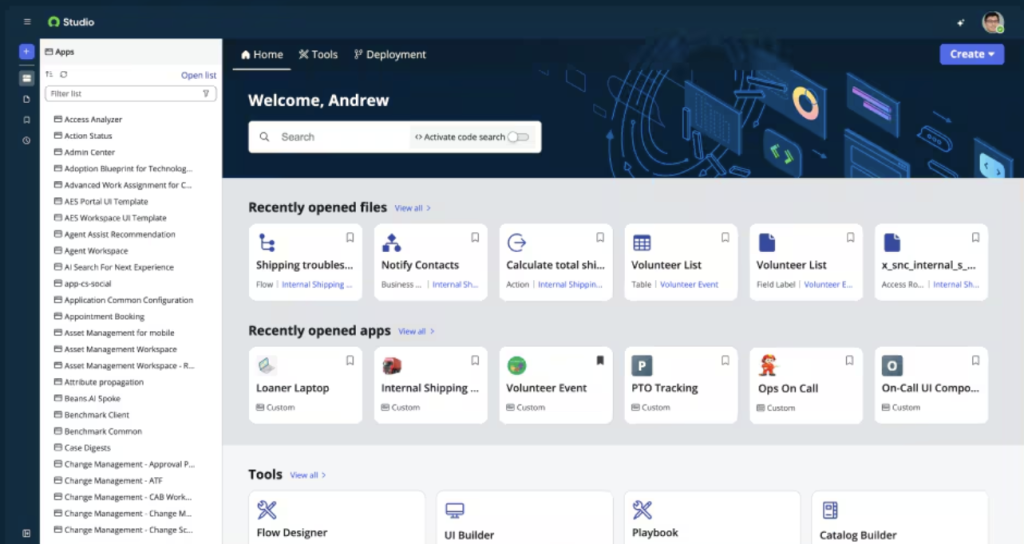
ServiceNow follows a process-first approach to AI, combining workflow automation, custom data models, and scalable orchestration on a single platform.
Instead of being just a support tool, it acts as a full enterprise operating system that uses AI to handle service, security, HR, IT, and CX across business units. Its AI Agents proactively swarm across functions, detect anomalies, assign tasks, and resolve requests across complex enterprise ecosystems.
Best Features
- Coordinate and act autonomously across IT, customer experience, human resources, and other areas.
- Combine AI, processes, analytics, and low-code application development.
- Use real-time data from several platforms to perform precise actions.
Ideal For: Enterprises with deep process needs, cross-department coordination, or ITSM-heavy orgs
Cloud-Based: Yes
| 🔑 What makes it stand out? ServiceNow functions more like an AI-powered control layer for the entire enterprise, not just support, which sets it apart from every other platform on this list. |
Ratings & Reviews
Choosing the Right Ticket Management Software for Your Needs
Choosing the right ticket management platform isn’t about picking the flashiest tool; it’s about knowing what your team actually needs.
Start by mapping out your must-haves: Is it AI triage? Industry-specific workflows? Or robust analytics? Shortlist tools that match those priorities, and always take a free trial to test how they fit your team’s real-world workflows.
If you’re looking for a solution that goes beyond checkboxes, Kapture is built to handle it all. Whether you’re in BFSI, Retail, Travel, or Utilities, Kapture offers deep industry alignment, powerful AI, and automation that works straight out of the box.
Ready to transform your support into a proactive, high-performance engine?
FAQs
Honestly, it depends on what your team needs — but if you’re looking for something that can scale with you, handle complexity, and still keep things personal, Kapture is a top contender. It’s built for real-world support teams that want AI automation without losing context or control.
The best platform is the one that actually fits your business logic. Kapture stands out because it’s a full CX engine that’s tailored to your industry. Whether you’re in BFSI, retail, travel, or utilities, it doesn’t just adapt; it comes pre-loaded with exactly what you need.
For barebones ticketing, there are decent free tools out there like Zoho Desk or Freshdesk’s basic tier. But if you’re serious about customer experience, free tools can only take you so far. You’ll eventually need something like Kapture that’s built to grow with you — and worth the investment from day one.
Ticket management software is a platform that organizes, tracks, and resolves customer issues efficiently. It ensures no query is missed, helps agents prioritize tasks, and provides managers with visibility into team performance. In today’s CX landscape, it’s important because it not only speeds up resolutions but also turns support into a trust-building, proactive function for long-term customer loyalty.
